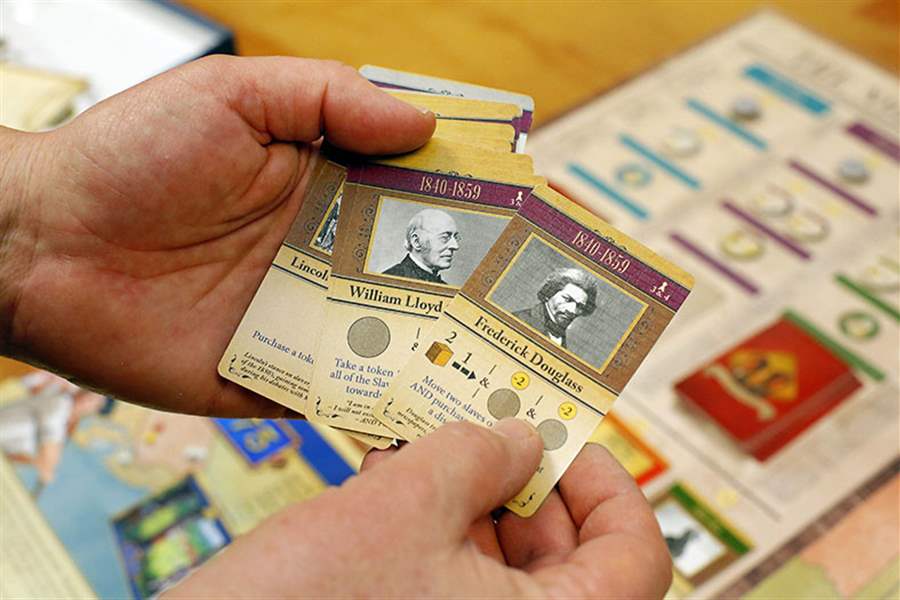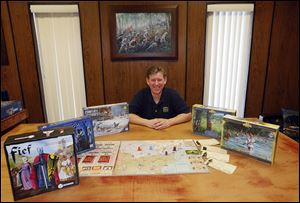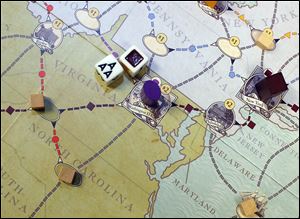
History, strategy more than just a game for local developer
Fremont man creates critical-thinking activities for schools, military
3/9/2014
‘Freedom — The Underground Railroad’ uses important figures in the abolitionist movement. Founder Uwe Eickert said a lot of research and sensitivity went into the development of the game.
THE BLADE/AMY E. VOIGT
Buy This Image

Uwe Eickert founded Academy Games in 2008. The company has published eight board games and plans to release five more.
FREMONT — Uwe Eickert loves to play games, but you won’t catch him playing cards or a simple board game like Monopoly.
When leisure time arrives, his playground is the past.
Mr. Eickert, 50, an engineer by training and entrepreneur by trade, is the owner and founder of Academy Games, a tiny Sandusky County start-up that specializes in complex, critical-thinking strategic games for uber-game players, classrooms, and even members of the military.
Mr. Eickert’s historical games — the company has published eight of them, which cost $70-$80 and is about to release five more — are designed to foster decision-making, the art of working with others, and dealing with the consequences.
As a general rule, Mr. Eickert’s games are designed to force players to make decisions every 15 seconds while also conducting negotiations.
In each of the company’s games, it’s nearly impossible for a single person to win alone.
“So these are all things like in real life. You can play the game any way you want. There’s no dictated path in all of our games,” Mr. Eickert said. “But almost all of our games are cooperative games, where you’re cooperating with other players, a group against another group, or you need to discuss with your opponents, come up with deals, trade, barter, whatever it takes in order to gain your objectives.
“So kids, in our games, they learn critical thinking — big time. It’s all about critical thinking and negotiating, and getting along with other people. That’s life, and that’s what we try to stress in our games.”
Academy Games is just six years old, but already the company has several prestigious awards to its credit.
It has won historical board game-of-the-year awards from the Academy of Adventure Gaming and Design for three of its military history games — “Awakening the Bear,” a game about Germany’s Operation Barbarossa invasion of the Soviet Union in 1941; “Storms of Steel,” a game about the tank battle outside the Soviet city of Kursk in 1943, and “Strike of the Eagle,” a game about the 1920 Polish-Soviet war.
The firm also won a coveted Charles S. Roberts award in 2008 for “Awakening the Bear.”
In August, Mr. Eickert used Kickstarter, a Web site where people can pledge money to fund any kind of project, to help launch “Freedom — The Underground Railroad,” a cooperative game where players are abolitionists helping southern slaves escape to the North.
Academy Games sought $10,000 in pledges but “Freedom” received nearly $80,000. In print already, it is being marketed to school systems to assist history classes.
John Ward, executive director of the Game Manufacturers Association, a nonprofit trade organization based in Columbus, said that for being a young company, Academy Games already has gained a lot of respect from gaming industry peers.
“The product line that Academy Games is in has done very well. They just make some very, very cool games,” Mr. Ward said.

‘Freedom — The Underground Railroad’ uses important figures in the abolitionist movement. Founder Uwe Eickert said a lot of research and sensitivity went into the development of the game.
“Freedom” is probably Academy Games’ boldest attempt yet to crack the potentially lucrative school market.
“It is a 100 percent team-play game. You either win together or lose together,” Mr. Eickert said. “Players win only about 40 percent of the time — if they’re lucky.
“It was a very difficult time [historically]. Slavery was ... big business, and the game takes that into account.”
The firm is in final talks with a major educational book publisher to get “Freedom” and other games distributed into school systems along with textbooks, Mr. Eickert said.
A large bookstore chain also would like to carry the game in its stores, he added.
“Freedom” is part of the firm’s “Birth of America” game series aimed at the education market. The series also includes “1775 Rebellion” and “1812 — The Invasion of Canada.”
The company is developing a fourth game in the series based on the French and Indian War, which started in 1754.
But “Freedom” is the one generating industry buzz, and like all Academy Games, it is fun but also historically accurate.
Overall credit for the 2½-year effort to develop “Freedom” went to Brian Mayer, an educational gaming expert and library technology specialist. But Mr. Eickert said confronting the nuances of “Freedom” to make it play according to historical norms “was a challenge.”
It required using many experts on slavery and lots of research to get a well-rounded view.
“You have to look at every viewpoint, and we always try to be as neutral as we can and bring in as many contemporary thoughts as to what went on, because neither you nor I can know what it was like to be a slave.” Mr. Eickert said. “We try to show all sides of it.”
Freedom
But unlike other games, the topic also required a great deal of sensitivity. The game itself, based on real laws and events, assumes the bad-guy role of slave marketers and slave catchers. Players become teams of abolitionists working to end slavery.
The decision to set up the game that way was critical. Done incorrectly or received badly, an insensitive game “overnight can sink your company — I mean overnight,” Mr. Eickert said.

Players of ‘Freedom’ become teams of abolitionists helping slaves escape from bondage and crossing over the Canadian border to liberty.
Even the "Freedom" box cover artwork was redone four times until Mr. Eickert was satisfied it showed “the desperation of the people of the time, but you also have to show the self-worth and the self-fulfillment.”
The artwork, which is the first thing a customer sees, “is everything,” he added.
Thinking skills
Although he was a game hobbyist, Mr. Eickert admittedly knew nothing about the industry when he began Academy Games in 2008. He only knew he wanted to join it.
A former engineer who previously worked for BASF Inc., Mr. Eickert created and sold seven businesses between 1992 and 2007. Primarily, though, during that time he ran his family’s Fremont-based cutlery firm, Arius-Eickert Inc., which made high-quality scissors for the hair-stylist industry and devices such as industrial diamond-coated blades for manufacturing.
When the family sold the firm in 2007, Mr. Eickert began looking for another line of work.
Gaming was his first thought.
He said that when he was getting his master’s degree at Ohio State, he concluded that he would learn the material better if were part of a game rather than in books and scholarly articles.
Mr. Eickert, who is of German descent, said critical-thinking games are part of childhood in the typical German family.
“Being German, it’s a central part of our growing up, doing these critical thinking games. And in America, kids grow up playing what’s known in the industry as Ameri-trash,” he said.
“An Ameri-trash game is a typical American game that most Americans in the past grew up with — you roll a die, you move so many spaces, and you do what the space tells you to do. Maybe then you make a decision: Do I buy or do I not buy?” he said.
“Whereas the Euro-games ... it’s all critical-thinking. You make decisions. You don’t make random moves from what a die roll tells you to do. You have different paths you can take in any game, you usually need to negotiate with other players in order to win, and so kids who play those type of games learned in such a different way than they did playing these typical roll-a-die, make-a-move games,” Mr. Eickert added.
Breaking in
But the Fremont businessman learned that the U.S. school industry is fragmented and does not use games often in the classroom.
“It takes years and years” to break into the school market, Mr. Eickert said.
He noticed the military-and-war games segment used by the armed forces also was very fragmented. But it had a huge need and demand for military squad-level and company-level training games for noncommissioned and young officers.
So Mr. Eickert met with U.S. Marine Corps officials and developed his first tactical war game, “Awakening the Bear.”
“Instantly, it became a best-seller, both in the military and open market,” he said. The game won several awards and was snapped up by branches of the military for training purposes.
“Nine months later we were in our third print run and I thought, ‘Wow, this could really be a business long-term,’ ” Mr. Eickert said.
“Awakening the Bear” was translated into Chinese, Spanish, French, German, Russian, and Portuguese and sold around the world. It became the company’s signature hit, leading to a computer version and several expansion packs. With its success came game designers who wanted to develop for Academy Games.
Mr. Eickert uses artists from several countries for his game boards, cards, game pieces, booklets, and box cover artwork. Printing is done in the United States, Germany, and China, he said.
Academy Games will soon launch five new games — two based on the Civil War battle of Gettysburg and three based on World War II: The battle of Guadalcanal, the U.S. Airborne campaign on D-Day, and the African desert battle between German Gen. Erwin Rommel and Britain’s heroic Desert Rats soldiers.
Whenever possible, the company tries to talk to veterans of a war or conflict to get their perspective on it.
The company has 15 more games in various stages of development. They include games about the Korean and Vietnam wars, outer space, the Viking invasion of England, and the Protestant Reformation.
One new game is being developed by American servicemen who served in Afghanistan. It focuses on current NATO military action against Taliban fighters in Afghanistan.
“Really, what we’re going for with all our games, is that through having fun, that you’re actually learning something. Violent games teach you to be violent. We’re trying to teach tactics to keep you alive, and for kids who play the games, to learn history,” he said.
And as a history buff, Mr. Eickert said he can’t imagine having made a better career choice.
“I get excited about this. It’s fun, you know? What a job to have.”
Contact Jon Chavez at: jchavez@theblade.com or 419-724-6128.